LINN — Jon Lecure is a proud Vietnam veteran spending his retirement in a lovely house in Linn tinkering on old cars and creating everything from walking sticks to rings made from antler sheds. …
This item is available in full to subscribers.
We have recently launched a new and improved website. To continue reading, you will need to either log into your subscriber account, or purchase a new subscription.
If you are a current print subscriber, you can set up a free website account by clicking here.
Otherwise, click here to view your options for subscribing.
Please log in to continue |
|
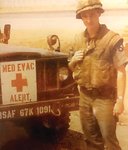
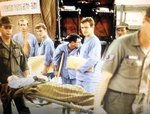
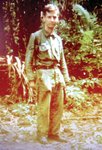
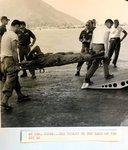
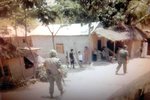
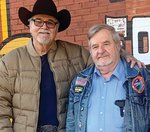
LINN — Jon Lecure is a proud Vietnam veteran spending his retirement in a lovely house in Linn tinkering on old cars and creating everything from walking sticks to rings made from antler sheds. His memories of Vietnam are important to him, and his time there brings back a lot of memories. Lecure served in the 903rd Aeromedical Evacuation Squadron from February 1968-1969.
“I think my tour in Vietnam was much easier than many men who served there,” Lecure said. “Sure, we were shot at occasionally, many times during night flights as we watched the tracers go past our aircraft, but I was not in firefights like the battles of A Shau Valley, the Siege of Khe Sanh, Hamburger Hill, the Battle of Ia Drang Valley, or the Battle of Hue.”
Lecure was living in his hometown of Leavenworth, Kan. when he received a notice to report to his Selective Service Office. During his visit, one of the ladies started giving him a speech about how he should be proud to serve his country.
Lecure began explaining to her that he had a draft deferment while attending college at the Automation Institute in Kansas City, where he studied computer programming and control-panel wiring.
“She kept asking me why I wasn’t ready to serve my country, and that is when I made my first mistake,” Lecure said. “I answered, ‘is that why your son has been going to college for over seven years?’ That was the wrong thing to say. I received my draft notice shortly afterward.”
Lecure was drafted into the Marine Corps in December 1965.
“But I wanted something in life besides the infantry,” Lecure explained. “I enlisted in the Air Force the same day, thinking I would get a better choice of job assignments.”
Lecure had hoped to continue his training with computers while in the Air Force, but the military had a different idea.
“I was given the choice to be a cook or a medic,” Lecure recounts. “Apparently, what was needed were cooks, medics, or infantry soldiers. I couldn’t see myself in a kitchen or the infantry, so I became a medic.”
Lecure finished his basic training in San Antonio, Texas, and finished medic training at Gunter Air Force Base in Montgomery, Ala. He was then stationed at Brooks Air Force Base in San Antonio at the School of Aerospace Medicine.
“I worked with the Aeromedical Evacuation Technician Course,” Lecure explained. “I also worked with courses for drafted physicians and nurses and temporary duty at Wilford Hall Hospital at Lackland Air Force Base in Texas.”
The connections he made would become important when he was deployed to Vietnam.
Lecure found himself getting bored with his day-to-day duties. He was assigned flight status and participated in the High-Altitude Experimental Pressure Chamber, taking chamber flights.
“This was during the time when space flights were being tested for altitude sickness,” Lecure explained. “Some flights lasted for a few minutes; others lasted for a week or more.”
Lecure took part in many flights in the altitude chamber, going to 40,000 feet.
“Most of my duties were to draw blood from rats and participate in other space-related duties,” Lecure said. “It was harder than it sounds.”
Lecure stayed in Texas for about 18 months and again found himself bored with the daily routine.
“I was ready for something new,” Lecure remembers.
He volunteered for Vietnam service.
“I just couldn’t sit back and do nothing,” Lecure said. “I wanted to do something useful and helpful with Vietnam.”
His orders to ship out came within a week. The Air Force was establishing a special medical unit to be deployed to Vietnam. This unit would serve in forward combat locations.
“We would actually replace another air evacuation unit, but ours was much more advanced due to the establishment of Casualty Staging Facilities, and would be working directly with the army in air evacuations.”
Lecure spent the next three months training at Pope Air Force Base in Fayetteville, N.C.
“When I arrived at Pope Air Force Base, I realized I knew most of the medics,” Lecure said. “That made it a lot easier to fit in.”
During those three months, Lecure studied advanced wound treatment, aircraft configurations for litters, radio operations, power supply, and map reading. Lecure was also assigned to jungle survival training in Panama.
“We were dropped off for one week in the jungle,” Lecure explained. “We had to float down the river about a mile, swim to shore, and then find our way back. This was probably the hardest of all the training. Nothing but snakes, tarantula spiders, scorpions, mosquitos, razor grass, heat, and rain, every day.”
Lecure added that he didn’t have food, a tent, or water. “It sounds easy,” he said. “You go to the bank and walk back upstream, but it doesn’t work that way. The jungle is thick with vegetation and thorns. It was quite the experience.”
Lecure lost 10 pounds that week.
“It was extremely hot, and after the first day, I was drinking dirty water like it was Kool-Aid,” Lecure remembers.
The 903rd Aeromedical Evacuation Squadron was made up of a 69-person emergency medical care team. Every member was required to be cross-trained in several jobs.
“The training would prove to be essential because each of us performed all of these jobs throughout our tour,” Lecure said.
Lecure arrived in Vietnam in early February 1968. The 903rd was headquartered at the Phu Cat Air Base. The group was split in two. Lecure arrived a week behind the first group. The Tet Offensive was underway, and his unit immediately began working.
“My very first night in Vietnam was spent in a bunker due to an attack on our base,” Lecure said. “It didn’t take long before I realized how the next 12 months were going to go.”
Lecure asked about his friend, Sgt. Sylvester McCullogh as soon as he arrived.
“I was told he was gone,” Lecure said. “It took a moment for me to understand that he was killed in an air evacuation mission a few days before I arrived.”
McCullogh boarded a helicopter at Khe Sanh, and the flight disappeared on the west side of DaNang Harbor.
“He was missing in action,” Lecure said. “Days went by with no word on his flight.”
In March 1968, evidence of a crash was found, and it was evident that no one had survived. Months later, a Marine division investigated the site of the impact and recovered some of the remains, later identified through DNA testing.
“His son contacted me a few times wanting to know all about his dad,” Lecure said. “Sgt. McCullough volunteered for that flight. I told him his dad was a hero.”
McCullough is buried in a mass grave at the Jefferson Barracks National Cemetery in St. Louis with all who perished.
“This was a bad time for our unit to have something horrible happen at the very start of our tour,” Lecure said.
It wasn’t the last bad news they would get. Lecure would call 1968 the year of “organized chaos.”
A few weeks later, they learned that several of their instructors had died in a fire at Pope Air Force base back in North Carolina.
Lecure was in Dong Ha in June when the ammo dump was hit and exploded.
“The year 1968 was a rough time in Vietnam,” Lecure said. “We had a heavy workload with a lot of casualties. A battle casualty would be air-lifted from the point of injury by a helicopter and brought to a forward combat base for treatment. The more seriously injured patients would be stabilized and evacuated to other locations. We saved many lives; some did not make it, but we took each one seriously.”
The unit rotated to serve several combat areas throughout central and northern Vietnam.
Lecure volunteered for a routine trip to Saigon. He was delivering records to the Military Airlift Command in Vietnam (MACV) when they came under small-arms fire.
“The driver and I jumped from the truck and dove into a drainage ditch,” Lecure explained. “I landed on my head and neck to avoid the gunfire.”
Lecure and the driver did not realize the ditch they dove into was full of sewage.
“I did make it to MACV, and they were happy when I left,” Lecure said. “I smelled terrible, and I could not get a shower because there was no water, and the beaches were off-limits. No one wanted to be around me.”
Lecure even had to ride with his legs hanging out the door of the helicopter since the pilot said he smelled so terrible.
“I walked the last mile in 115-degree heat, smelly clothes, boots, flak jacket, helmet, and M-16 rifle,” Lecure said. “I found a rain barrel full of water and stripped down to nothing and climbed in. It was the best bath ever.”
Lecure had done a lot of damage to his neck and still suffers from the injury.
In October 1968, the building of the 903rd was hit by Viet Cong Sappers.
“They were attempting to get to the flight line to attack our aircraft,” Lecure said. “Now, here is the dumb part of the story. My commander, myself, and another medic went to the building right after the attack. My commander had an M-16. All I had was a three-foot piece of pipe, and the other medic had nothing. I’m not sure why I got volunteered for that since it was a stupid thing to do after an attack.”
All eight of the Viet Cong Sappers were eventually eliminated by a C-47 gunship.
Lecure’s unit treated and evacuated over 10,000 patients during the 30 days of the Tet Offensive. The goal was to provide evacuation for wounded soldiers with care provided while waiting for airlifts. Few patients were in their care for more than 24 hours.
During the last few months of his tour, Lecure participated in several Medical Civics Action Program (MEDCAP) missions. Teams would drive to remote villages and treat civilians.
“There was a lot of Agent Orange sprayed near these villages because most of the surrounding vegetation was brown and dead,” Lecure explained. “Our treatment would be anything from treating wounds, giving injections, treating infections, and dispensing medicine. I’m sure that we treated both civilians and some Viet Cong.”
Lecure tells the story of an old man who had his finger cut off by a machete. Lecure was concerned he would lose the whole hand to infection.
“I tried to get the old man to drop his pants so I could give him an injection to fight his infected finger,” Lecure explained. “He could not understand what I was saying, so I pointed to myself, dropped my pants, and pointed to my rear end. He smiled and nodded, dropped his pants, and I gave him the injection. Sometimes I had to be inventive due to the language barrier.”
The old man came back to the Air Force Base to have his finger treated properly.
For Lecure, being a part of the 903rd was a once-in-a-lifetime experience.
“We saved hundreds of lives, went through many attacks, survived a few crash landings, and still managed to have some fun,” Lecure said. “Our battle was to save lives and help these soldiers return home.”
Lecure has been to visit the Vietnam War Memorial in Washington, D.C., and each time he remembers just staring at the names on the wall and wondering how many of the names his unit treated.
“It makes me wonder if there is more I could have done to send them back to their families so they could live a full life,” Lecure said. “That feeling never leaves you.”
Though Lecure’s time in Vietnam was 54 years ago, the memories come back easily to him.
“Of the original 69 of us who mostly volunteered, there are not many of us left,” Lecure said. “Each year, we lose another brother. I am proud to have served with them.”